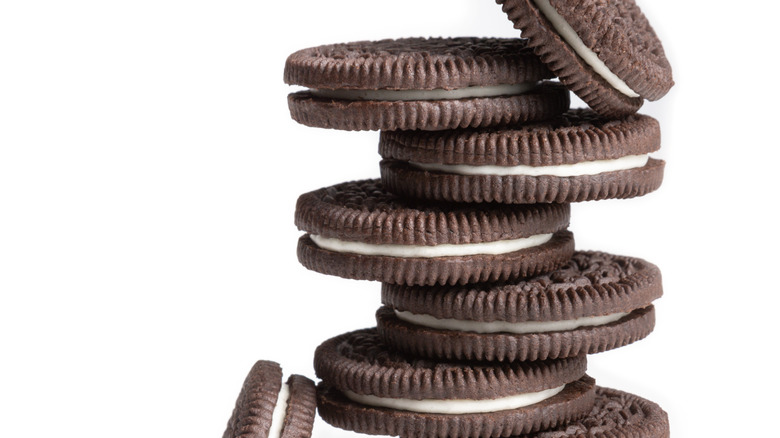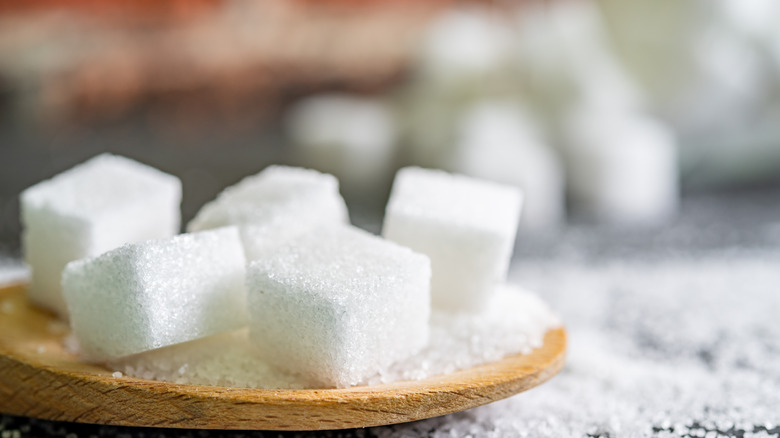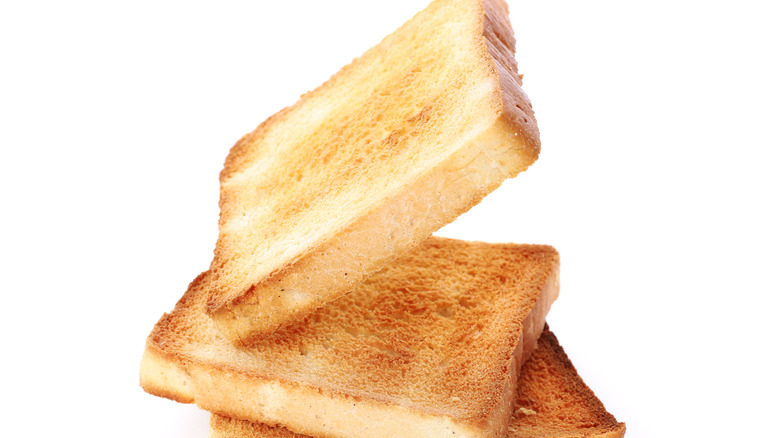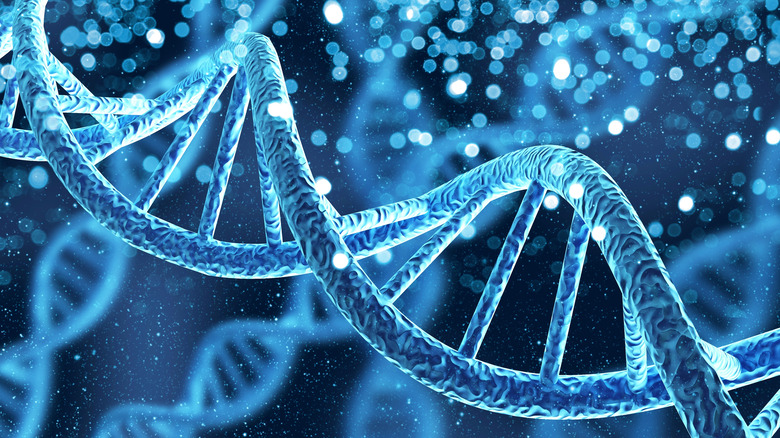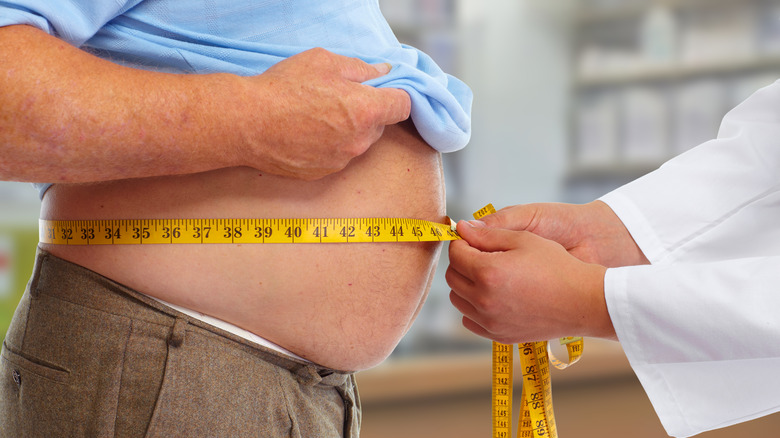14 Common Causes Of Belly Fat
For many people, belly fat can be one of the more stubborn types of fat to lose. Even after dieting and exercising, abdominal fat can still linger, making you feel like your weight loss efforts were in vain.
If it's any comfort, there is a scientific explanation as to why belly fat is typically the last to go. Dr. Luke James from Bupa UK spoke to Cosmopolitan UK to shed more light on the topic. He explained that there are two types of fat cells in the body, alpha and beta, which metabolize at different rates — alpha cells metabolize faster, and beta cells metabolize slower. Unfortunately, the belly is primarily made up of beta cells, and as James stated: "To put it simply: it's more difficult to shift belly fat because it has a higher amount of fat cells that don't respond as easily to the fat-breakdown process (lipolysis)." So there's the bad news.
The good news, however, is that there are things that you can do to slow down the accumulation of belly fat, whether it's through diet, lifestyle changes, or a combination of all three. Knowledge is power, so continue reading to discover 14 of the most common causes of belly fat and how to avoid them.
Stress
Long day at the office? Never ending list of to-dos? If you're feeling the extra weight of stress and are perplexed by the extra weight around your abdomen, there may be a connection between the two.
If you haven't previously heard of the link between stress and belly fat, it may seem hard to believe these two things could be connected — but the science doesn't lie. According to Healthline, when we're stressed, our bodies produce a hormone called cortisol. Typically, after the stressful event has passed, our cortisol levels drop back to normal. But if we experience stress over long periods of time, these levels can remain elevated. Several studies have observed a strong correlation between high cortisol levels and abdominal fat, and it has also been linked to other belly related issues such as IBS, vomiting, and diarrhea, according to experts at the site.
If you suspect your excess belly weight is related to stress, experts suggest taking steps to alleviate stress by taking time out to meditate, or to speak to close friends if that's what you need. Exercise can also help to reduce stress (and contribute to weight loss), so it's another thing you can add to your list of stress-reducing activities.
Menopause
While menopause and the ensuing side effects are an inevitable part of every woman's life, there are things you can do to manage some of the more unpleasant side effects — including the accumulation of unwanted belly fat.
According to experts at Everyday Health, as women reach menopause, the way weight is distributed in the body changes, and more of it can start to appear around the midsection. The site goes on to explain that even though this is a natural phase of life, the accumulated fat caused by menopause can put women at risk of cardivascular disease at the same rate as non-menopausal people who are obese. It might seem unfair, but experts conclude that more effort is simply required at this phase of life than at other phases.
Kathryn A. Boling, MD, a family medicine physician at Medical Center in Baltimore, spoke to Everyday Health and explained, "What we did when we were 30 and what we do when we're 60 is very different. We have to adjust our exercise some as we get older." As for what type of exercises to try, she explains: "Try activities that have you lifting, pushing, and pulling."
Lack of exercise
Speaking of exercise, it might not come as a surprise, but not getting enough exercise is one of the primary contributors to the accumulation of abdominal fat.
According to WebMD, not only can belly fat be unsightly, but it can also contribute to a variety of major health concerns. Some of the conditions that can result from extra abdominal fat include high blood pressure, high cholesterol, type 2 diabetes, and heart disease. Some exercises are better than others when it comes to getting rid of belly fat, and the site starts off by recommending either aerobic or cardio exercises for 30 minutes every day. These types of exercises include running, rowing, swimming, or group fitness classes.
Next, experts recommend a type of high intensity interval training (HIIT), which combines a short period of intense exercise followed by rest on repeat. These types of exercises significantly increase your heart rate and are good for reducing belly fat and overall physical health. Examples of HIIT exercises include burpees, jumping jacks, and jump squats. You can also do certain abdomen exercises (some of which you may be familiar with) such as crunches, leg lifts, and planks to help target abdominal fat.
Artificial trans fat
If you've been paying attention to the public discourse about trans fat, you're probably aware that at some point, they became public enemy number one. With artificial trans fats being deemed unsafe for human consumption and banned by the FDA in 2015, the public became painfully aware of the dangers of this ingredient (via FDA).
So what are trans fats, exactly? And how can they contribute to belly fat? According to Healthline, trans fats are a type of unsaturated fat that can be either artificial or natural. Natural trans fats are found in meat and dairy and are safe when consumed in small quantities; however, artificially manufactured trans fats are dangerous to your health, and have been linked to heart disease, diabetes, and weight gain.
A study published by Wake Forest University revealed that trans fats can specifically lead to the accumulation of belly fat. In a public statement about the study, Wake Forest researcher Lawrence L. Rudel, PhD explained, "Trans fat is worse than anticipated. Diets rich in trans fat cause a redistribution of fat tissue into the abdomen and lead to a higher body weight even when the total dietary calories are controlled."
Alcohol
Kicking back with a few drinks seems like a good way to cut back on stress, but if you're on a diet, those few extra drinks may be wreaking havoc on your waistline. You've probably heard the term "beer belly" before, and while it might sound funny or even charming, the added abdominal fat associated with alcohol, specifically beer, is very real.
According to Healthline, all alcohol is "empty calories," which means the calories they contain do not go toward filling you up or providing you with nutrients. One beer contains approximately 155 calories, while a glass of wine has 125, which can slowly (or quickly) add up over the course of an evening. One particular study published by Epidemiology and Health found a strong correlation between high alcohol consumption and high waist circumference.
Another Healthline publication points out the possibly indirect connection between beer and a high waist circumference: the foods that typically accompany beer drinking. Pizza, fries, burgers, and other assorted junk foods are often consumed during or after a night of drinking, which doesn't help matters. Furthermore, experts explain that the body typically burns the calories from alcohol before it burns other fat, which can slow down your weight loss process as well.
Sugar
You probably knew sugar would make an appearance on the list at some point. Like trans fat, sugar has a pretty bad rap in the world of nutrition for its contribution to a number of health maladies. If you've tried cutting back on trans fats, alcohol, and took up exercising, but still struggle with stubborn belly fat, your daily latte may be to blame.
Vera Tarman, MD, an addiction physician who works with people who struggle with food and sugar addiction, spoke to Pop Sugar and explained how sugar can contribute to a growing waistline. "Refined sugar overwhelms our natural hormonal treatment of sugar and the body (through insulin spikes) takes the excess sugar and parks it into the abdomen. That's why insulin is known as the 'fat-storing hormone," she said. The type of fat that is stored in the abdomen and around the organs is known as visceral fat, and can lead to inflammation, heart disease, high cholesterol, and diabetes.
Furthermore, you might not be surprised to find out that most sugary foods are high in calories and offer little nutritional value by way of fiber, healthy fats, or protein, which may trigger overeating.
Refined carbohydrates
Carbohydrates are another food component with a less-than-stellar reputation. However, there are "good carbs," also known as whole carbohydrates, and "bad carbs," known as refined carbohydrates, which affect the body in different ways.
Whole carbohydrates can be found in legumes, whole grains, vegetables and fruits (per Healthline), and have many positive effects on your health. Unrefined carbs, on the other hand, can be found in many processed foods like white bread, pastries, and sugary drinks, and can cause blood sugar spikes and lead to diabetes, and — you guessed it — belly fat.
Trista Best, MPH, RD, LD, a registered dietitian with Balance One, spoke to Eat This, Not That! and discussed the dangers of refined carbs. "Refined carbohydrates are processed quickly by the body and easily stored as fat. They provide a quick source of energy, but this energy comes in the form of a glucose spike and inevitable crash." As Best explained, the crash that follows not only makes the person experience hunger once again — no matter how much they ate — but can also increase the body's insulin resistance, resulting in "higher glucose and weight gain as the body begins to store the excess glucose as fat.
Imbalanced gut bacteria
Struggling with excess belly fat and think an imbalance of intestinal bacteria may be to blame? Trust your gut. Jokes aside, scientists have discovered a strong link between the balance of "good" and "bad" gut bacteria and obesity.
According to experts at Healthline, the bacteria found in our gut is responsible for how we digest our food, how many nutrients we absorb from our food, and they also produce hormones that regulate our satiety. A study published in the journal, Nature, examined 77 pairs of twins, with one person in the set of twins being obese, and the other an average weight. The study found that the obese twins had a different makeup of gut bacterira and generally had "reduced bacterial diversity" and "metabolic pathways." A possible contributing factor to these variations is the consumption of fiber, which can trigger gut bacteria to produce certain enzymes that lead to weight loss.
If you want to improve the balance of bacteria, another report from Healthline suggests adding probiotics to your diet, which could potentially help you lose belly fat. Experts at the site cite studies that have shown that bacteria in the Lactobacillus family, which can be found in yogurt, have been linked to a reduction in belly fat.
Lack of sleep
If you've tried exercise, dieting, and cutting out alcohol to try to lose belly fat and are tired of all the stress it's causing, maybe you should just take a nap.
According to experts at WebMD, there are a number of direct and indirect factors associated with lack of sleep that combine to create the perfect storm for weight gain. For starters, when you wake up groggy after a less than perfect night of sleep, your brain activity is actually "dulled" to the point of mimicking inebriation. In this state, people tend to make bad decisions when it comes to food, and may be looking for a quick pick-me-up, such as a sugary latte or some other unhealthy food craving that will make you feel good in a snap. Essentially, the self-control that you normally feel when you are well-slept has gone out the window.
Physically speaking, a lack of sleep can also lead to a slowed-down metabolism, resulting from your body's inability to process insulin properly when it is sleep-deprived. Lastly, a study published by Sleep found a positive correlation between sleep extremes and increased visceral adipose tissue and subcutaneous adipose tissue in the abdomen.
Genetics
If you're feeling bad about how long it's taking to get rid of your spare tire, you can always just blame your parents.
Kidding aside, scientists have discovered that genetics play a significant role in how fat is distributed in your body — and whether that burger will go to your hips, thighs, or belly. Epidemiology professor Lu Qi, M.D., Ph.D., the director of the Tulane University Obesity Research Center, spoke to Shape to discuss the ways genetics contribute to the distribution of body fat. "You can inherit abdominal-fat-risk gene variations from your mother or your father or from both," she explained. Experts at the site explain that 49 genes contribute to the presence of abdominal fat, 19 of which have a stronger effect on women.
Despite this news, it is possible to "outsmart" genetics with a few key strategies. Yann Klimentidis, Ph.D., an assistant professor of epidemiology and biostatistics at the University of Arizona's Mel and Enid Zuckerman College of Public Health, explained to the publication, "Those at high genetic risk for abdominal fat can still shed it through exercise; it may just be a more challenging and lengthier process than it is for someone with less genetic risk." Exercises such as HIIT and core training through pilates are both great ways to eliminate stubborn fat.
Smoking
It's no secret that smoking is not good for you: it reduces your lung capacity and can lead to cancer, heart disease, lung disease and much more (via CDC). To add insult to injury, research suggests that on top of all of that, it can also lead to an accumulation of belly fat.
According to WebMD, heavy smoking can actually "push" fat into the abdominal region. A study published by the journal BMJ Open evaluated 148,731 "current, former and never-smokers" and found a positive correlation between current smokers and high waist circumference. Although the study claimed that smokers had better weight control, heavy smoking contributed to the accumulation of fat around the gut area. Professor Naveed Sattar of the University of Glasgow, who contributed to the study, explained in a public statement, "So, when smoker[s] put on weight, they will show bigger tummies for same weight gain than non-smokers, and this may also be linked to their greater risk for diabetes. If confirmed, a tendency for smokers to acquire an 'apple shape' might provide a novel health promotion message to encourage smoking cessation." Those who have apple-shaped bodies (meaning they carry more weight in their middle) are known to be less healthy than those who have pear-shaped bodies, who carry more weight in the hip and thigh area.
Age
As we age, our bodies change in a number of ways that require a shift in routine. Unfortunately, one of the ways our bodies evolve is by packing on a few extra pounds in the belly area.
According to experts at Livestrong, there are several reasons for this shift. One of the first reasons is a general decrease in activity, which can lead to a decrease in metabolism. The American Council on Exercise reports that women lead the way in weight gain by packing on an average of 5 pounds every 10 years between the ages of 22 and 45, compared to men who gain 3.4. The site goes on to explain that muscle mass also decreases as we age, which makes for a higher percentage of overall body fat. If you continue to eat the same as when you were younger, this will inevitably lead to weight gain.
Hormones are another culprit at play in bulging bellies. As previously mentioned, menopause can be a major contributor for women due to drops in estrogen levels. For aging men, however, dips in testosterone are also correlated with increased belly fat. Experts at the site recommend cardio, cutting back calories, and potentially hormone therapy as ways to combat belly fat.
Medication
Sadly, some factors that contribute to weight gain can feel quite out of our control. Many medications bear significant side effects, and if your doctor has prescribed you a medication with weight gain as a side effect, there are several things to keep in mind before you move forward.
Experts at Everyday Health say that before your doctor prescribes you any medication, it's important to ask them what the side effects will be — and if you are uncomfortable with the potential for weight gain, to ask if the dose can be lowered or if there are any alternatives. As far as what drugs lead to weight gain, the site lists tricyclic antidepressants at the top of their list. Experts say that one of the side effects of these drugs is that they stimulate your appetite, which can lead to weight gain. Instead of quitting your anti-depressants, you can talk to your doctor about taking another class of drugs that doesn't list weight gain as a side effect.
Other classes of drugs that can lead to weight gain are corticosteriods, antihistamines, insulin, epilepsy medication, and beta blockers. Maintaining a healthy diet and exercising during the course of your medications is another way to help reduce the negative side effects.
Lack of fiber
As you may have already read, fiber plays a key role in managing your gut health, which can contribute to a healthy weight. On the other hand, a lack of fiber can spell trouble for your gut and its circumference.
According to Healthline, one particular type of fiber, and one type only — soluble fiber — is responsible for helping to shrink your waistline. Experts at the site explain that insoluble fiber differs from soluble fiber in that it doesn't mix well with water and can facilitate bowl movements. Soluble fiber, on the other hand, does mix well with water, and can slow down the speed at which the stomach releases food into the intestines. As previously mentioned, fiber contributes to an increased diversity of gut bacteria, which is connected to lower incidences of weight gain, specifically around the belly.
Another way that soluble fiber helps reduce weight gain is by reducing your appetite. Soluble fiber is connected to the hormones that regulate your appetite, and eating more of it can keep you from reaching for that bag of potato chips, which are known to pack on the pounds. Examples of foods with soluble fibers include oatmeal, flaxseeds, oranges, apricots, Brussels sprouts, and legumes.





